
Chania: A Timeless Jewel of Crete
Chania, located on the northwest coast of Crete, is a mesmerizing blend of historical richness and natural beauty. The town's charming Venetian harbor is the perfect starting point for any visit. Lined with pastel-colored buildings, quaint cafes, and traditional tavernas, the harbor offers a picturesque setting that evokes the essence of Mediterranean life. Wander through the narrow, labyrinthine streets of the Old Town, where you'll encounter a harmonious mix of ancient architecture and modern influences. The Venetian and Turkish buildings, each with its own story to tell, create a unique atmosphere that is both romantic and vibrant. Don't miss the opportunity to visit the Archaeological Museum of Chania, housed in a former Venetian monastery, to delve deeper into the region’s fascinating past. For nature enthusiasts, the nearby Samaria Gorge offers an unforgettable hiking experience. The gorge, one of Europe's longest, is a haven for wildlife and provides breathtaking views of Crete's rugged landscape. After a day of exploration, relax on the pristine beaches of Chania, such as Elafonissi and Balos, where crystal-clear waters and soft sands await. Chania is also a culinary delight. Savor local dishes like dakos, lamb with stamnagathi, and fresh seafood, all prepared with ingredients sourced from the island's fertile lands and surrounding seas. Whether you're sipping raki at a local taverna or enjoying a gourmet meal at a seaside restaurant, the flavors of Chania are sure to leave a lasting impression.
Local tips in Chania
- Explore the Venetian harbor early in the morning to avoid crowds and capture stunning photos.
- Wear comfortable shoes for walking through the Old Town's cobblestone streets.
- Visit the local markets to purchase fresh produce and traditional Cretan products like olive oil and honey.
- Check the weather before hiking Samaria Gorge; it can be challenging during the peak summer months.
- Try to dine at a local taverna to experience authentic Cretan hospitality and cuisine.
- Rent a car if you plan to explore Chania's beaches and surrounding countryside.
Chania: A Timeless Jewel of Crete
Chania, located on the northwest coast of Crete, is a mesmerizing blend of historical richness and natural beauty. The town's charming Venetian harbor is the perfect starting point for any visit. Lined with pastel-colored buildings, quaint cafes, and traditional tavernas, the harbor offers a picturesque setting that evokes the essence of Mediterranean life. Wander through the narrow, labyrinthine streets of the Old Town, where you'll encounter a harmonious mix of ancient architecture and modern influences. The Venetian and Turkish buildings, each with its own story to tell, create a unique atmosphere that is both romantic and vibrant. Don't miss the opportunity to visit the Archaeological Museum of Chania, housed in a former Venetian monastery, to delve deeper into the region’s fascinating past. For nature enthusiasts, the nearby Samaria Gorge offers an unforgettable hiking experience. The gorge, one of Europe's longest, is a haven for wildlife and provides breathtaking views of Crete's rugged landscape. After a day of exploration, relax on the pristine beaches of Chania, such as Elafonissi and Balos, where crystal-clear waters and soft sands await. Chania is also a culinary delight. Savor local dishes like dakos, lamb with stamnagathi, and fresh seafood, all prepared with ingredients sourced from the island's fertile lands and surrounding seas. Whether you're sipping raki at a local taverna or enjoying a gourmet meal at a seaside restaurant, the flavors of Chania are sure to leave a lasting impression.
Iconic landmarks you can’t miss
Old Venetian Port of Chania
Explore Chania's Old Venetian Port: A picturesque harbor blending Venetian and Ottoman history with vibrant waterfront attractions and stunning sunsets.
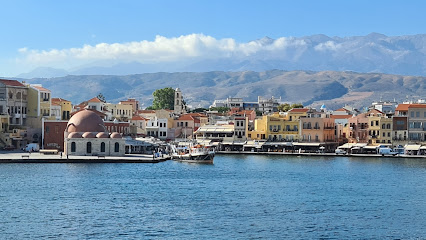
Talos Square
Discover Talos Square in Chania: a vibrant hub where history, culture, and local charm converge in the heart of the Old Town.
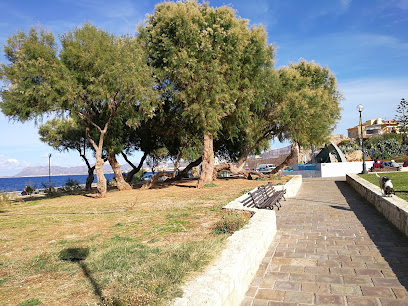
Kastélli
Explore Kastélli in Chania: Uncover Minoan history, Venetian architecture, and stunning views in Crete's ancient heart.
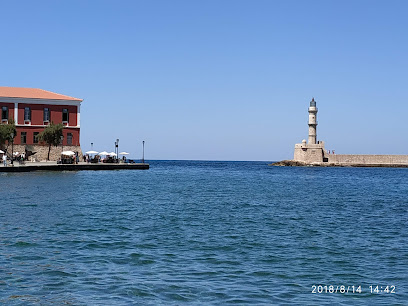
Ottoman fountain
Discover the Ottoman Fountain in Chania: A historical landmark blending Venetian and Turkish influences in a vibrant city center.
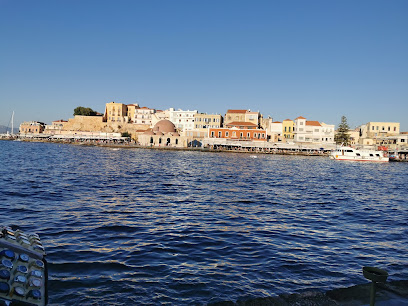
Byzantine/Post-Byzantine Collection of Chania | Βυζαντινή/Μεταβυζαντινή Συλλογή Χανίων
Explore Byzantine, Venetian, and Ottoman artifacts in a 15th-century monastery showcasing Chania's rich historical and artistic heritage.
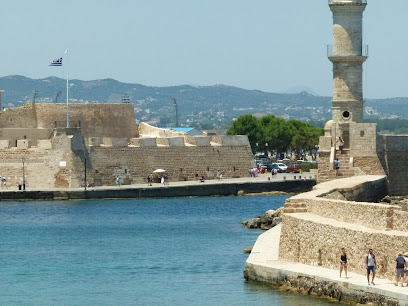
Byzantine Walls Of Chania
Explore the ancient Byzantine Walls of Chania, a historic landmark showcasing centuries of resilience and architectural adaptation.
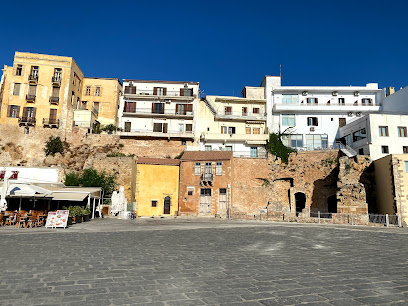
Byzantine Walls
Explore the ancient Byzantine Walls of Chania, a historic fortress showcasing the city's layered past and strategic importance.
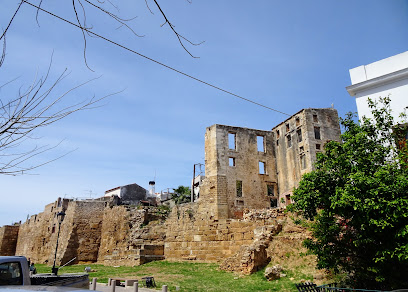
Painted Wall of Minoan Theme
Discover the artistic brilliance of the Minoan civilization at this captivating mural in Chania, a window into Crete's rich cultural past.
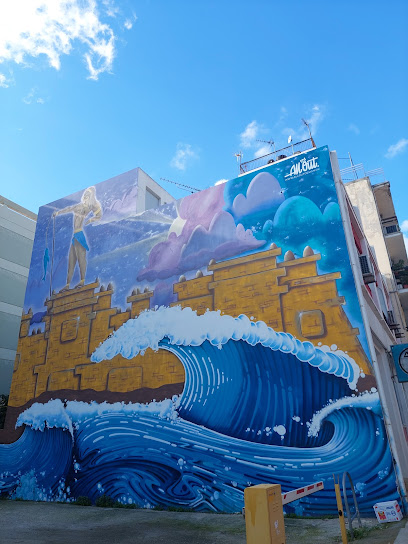
Statue von Athenagoras I
Visit the Statue of Athenagoras I in Chania to experience a historical landmark embodying Crete's cultural and spiritual legacy.
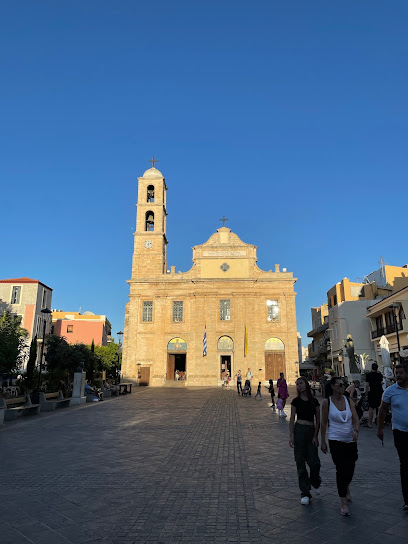
Statue de Captain Mathios Milonogiannis
A tribute to Cretan hero Captain Mathios Milonogiannis, commemorating his leadership in the island's fight for freedom during the Great Cretan Revolution.
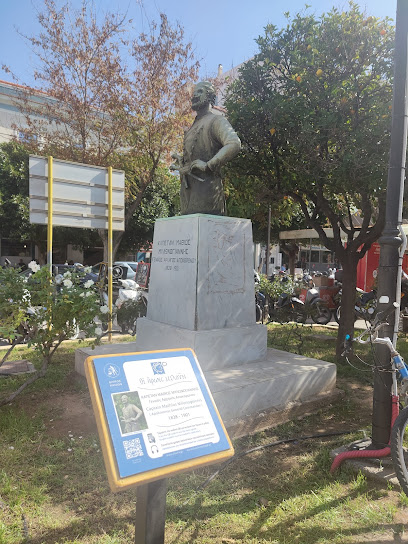
Unmissable attractions to see
Archaeological Museum of Chania | Αρχαιολογικό Μουσείο Χανίων
Discover the rich history of Crete at the Archaeological Museum of Chania, featuring captivating Minoan artifacts and ancient treasures.
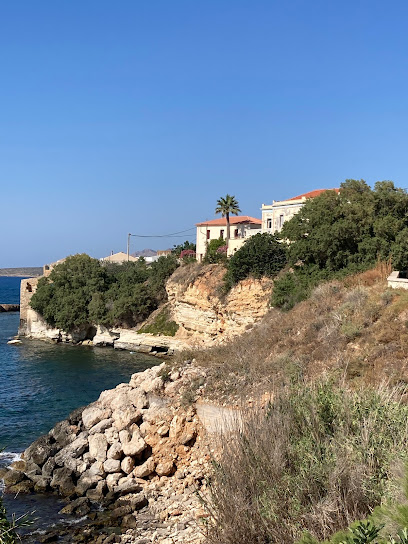
Minoan's World 9D Experience
Discover the Minoan civilization through immersive 9D technology at Minoan's World in Chania, a must-visit cultural attraction for all ages.
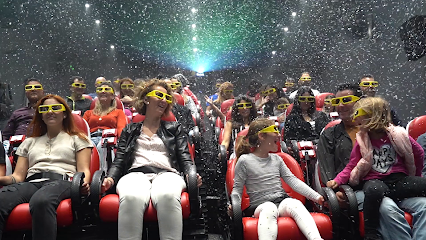
Tampakaria
Explore the historic charm and stunning coastal beauty of Tampakaria, a must-visit neighborhood in Chania, Crete, for every traveler.
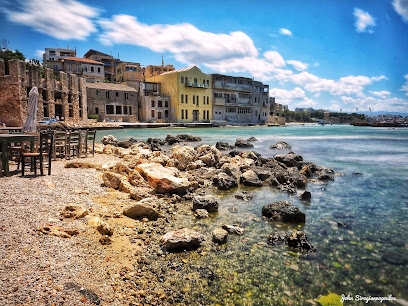
Chania Ebike Tours
Experience the beauty of Chania, Greece, on electrifying ebike tours that combine adventure, history, and stunning landscapes.
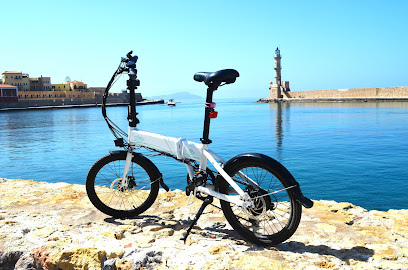
Essential places to dine
PALLAS
Discover Pallas in Chania: A culinary haven offering exquisite local dishes and stunning sea views in an inviting lounge atmosphere.
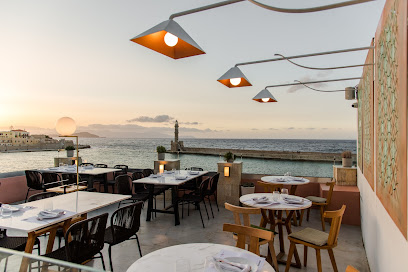
TAMAM RESTAURANT CHANIA
Experience authentic Cretan cuisine at Tamam Restaurant in Chania's historic Old Harbour, where fresh ingredients meet stunning waterfront views.
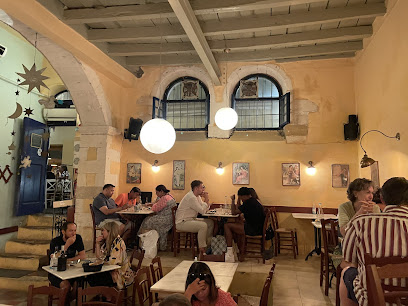
To Stachi slow food
Experience authentic Cretan vegetarian and vegan cuisine at To Stachi in Chania, where slow food meets sustainability.
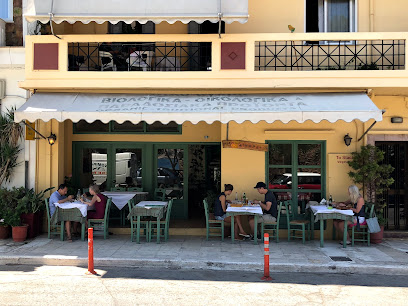
Kritamon Wine Restaurant
Discover authentic Mediterranean flavors at Kritamon Wine Restaurant in Chania – where tradition meets exquisite wine.
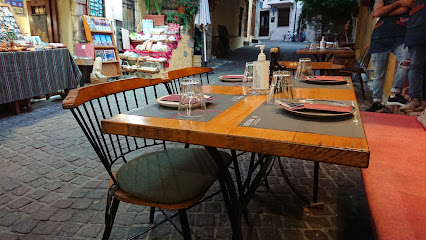
Arismari, Cretan Creative Cuisine - Αρισμαρί, Από Την Κρητική Γη
Experience authentic Cretan cuisine at Arismari, where fresh local ingredients meet traditional recipes in Chania's charming setting.
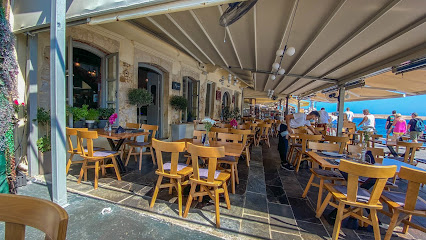
The Five Restaurant
Experience exquisite Mediterranean dining at The Five Restaurant in Chania, where fresh local ingredients meet stunning coastal views.
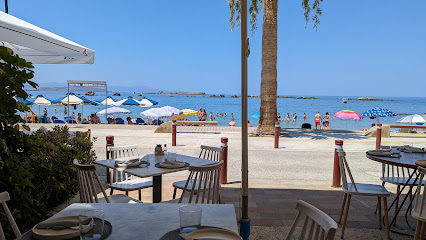
Kariatis Restaurant
Experience exceptional Italian cuisine and fresh seafood at Kariatis Restaurant in Chania's enchanting Old Harbour.
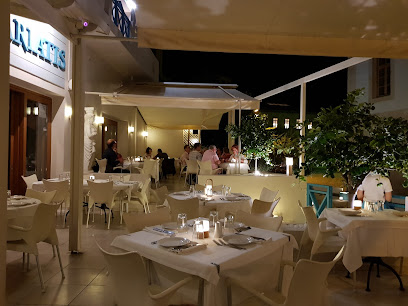
il Padrino
Savor authentic Italian flavors at il Padrino in Chania - where every meal is a celebration of culinary excellence.
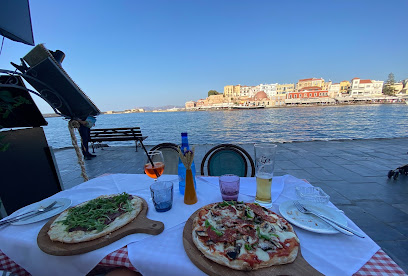
Theodosi restaurant
Experience exceptional Greek cuisine at Theodosi Restaurant in Chania - where fresh ingredients meet Mediterranean elegance.
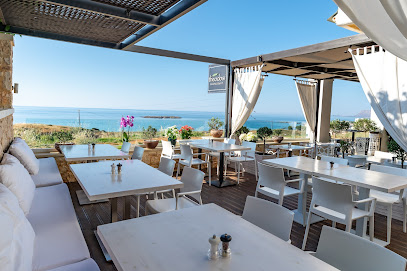
Oinoa
Discover Oinoa in Chania - where traditional Greek cuisine meets modern culinary artistry for an unforgettable dining experience.
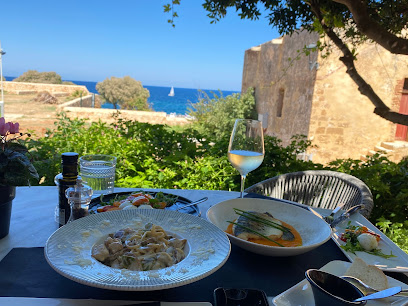
Markets, malls and hidden boutiques
Temple Gift Shop
Explore the enchanting Temple Gift Shop in Chania - your destination for unique souvenirs and exquisite lighting pieces from Greece.
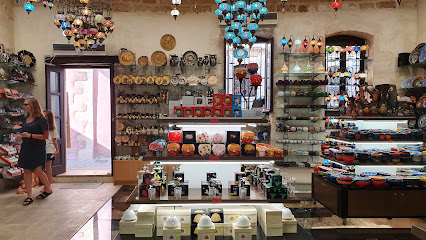
Memorabilia
Explore the charm of Chania at Memorabilia gift shop, where unique Cretan treasures await every visitor.
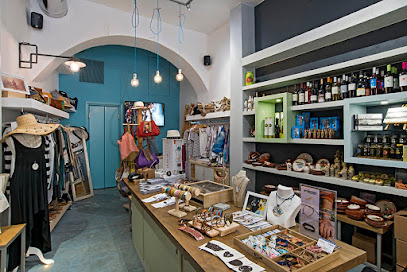
KURKUTA
Discover the unique gifts and local crafts at KURKUTA, a charming shop in Chania, Greece, perfect for souvenirs that capture the essence of your travels.
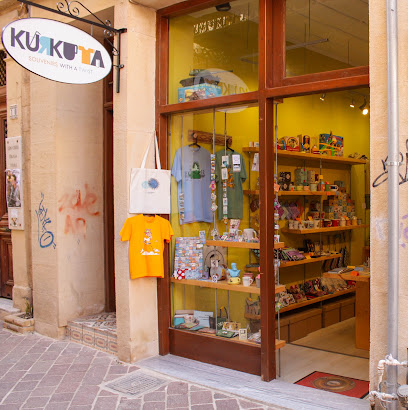
Eleonora Boutique Chania
Discover fashion treasures at Eleonora Boutique in Chania, where style meets authenticity through women's apparel and unique accessories.
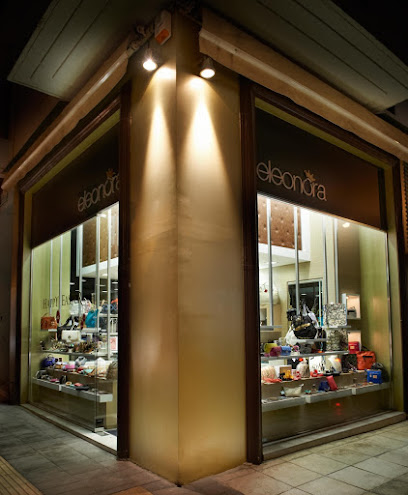
Secret Paradise Chania
Explore Secret Paradise Chania for unique local crafts and authentic Cretan souvenirs in a charming shopping atmosphere.
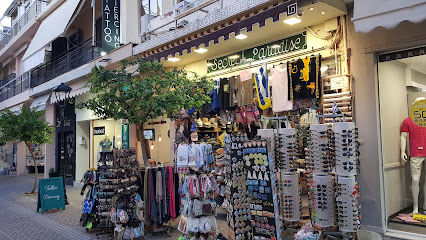
Mini Art Shop
Explore unique handcrafted gifts and ceramics at Mini Art Shop in Chania, a treasure trove of Crete's artistic heritage.
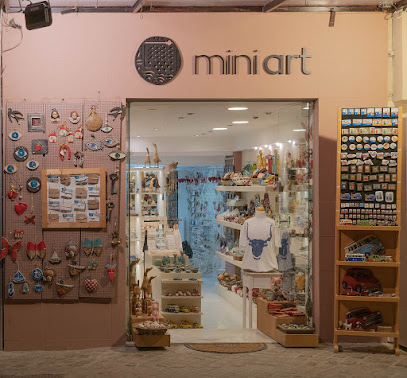
Elephant Store
Explore Elephant Store in Chania for unique gifts, local jewelry, and stylish clothing that capture the essence of Crete.
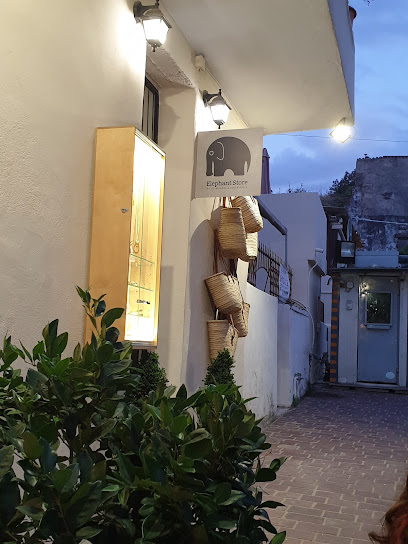
Anastasia Store
Explore stylish clothing, unique accessories, and exquisite jewelry at Anastasia Store, your fashion destination in Chania, Greece.
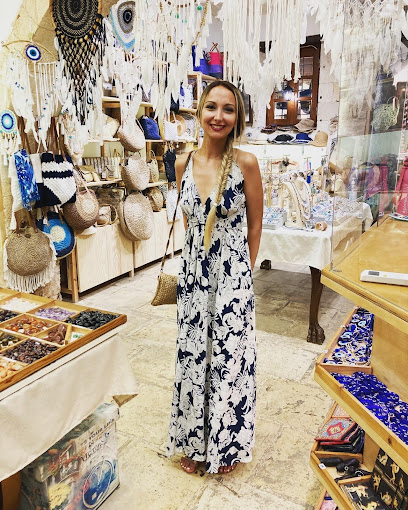
Agora Products Boutique
Discover unique gifts and local artisan treasures at Agora Products Boutique in Chania, a must-visit destination for every traveler.
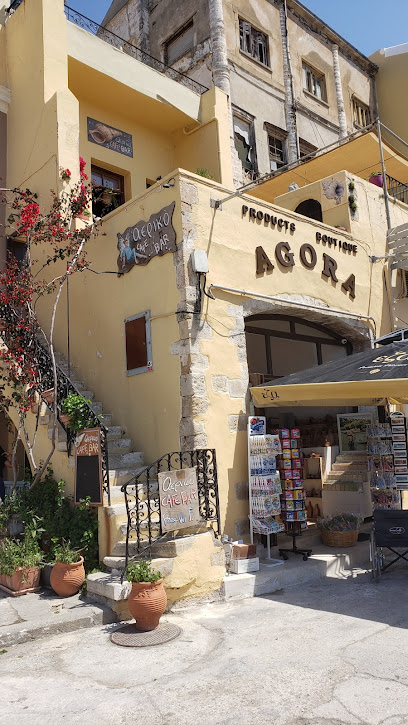
Anemi
Discover the essence of Crete at Anemi, a charming gift shop in Chania offering unique local crafts and souvenirs for every traveler.
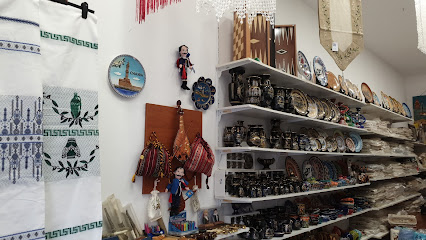
Essential bars & hidden hideouts
Sinagogi coctail bar
Discover Sinagogi Cocktail Bar in Chania for an unforgettable night of creative cocktails and vibrant nightlife, a true gem in Greece's stunning city.
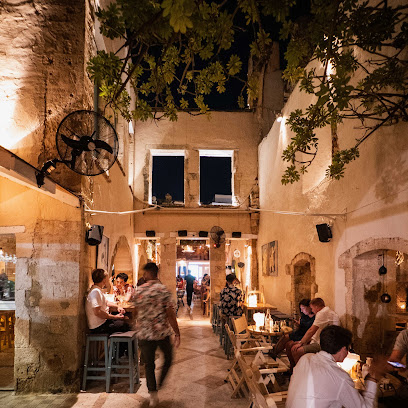
Το μοναστήρι του καρόλου
Experience the art of cocktail crafting in a serene garden setting at Το μοναστήρι του καρόλου in Chania, Crete.
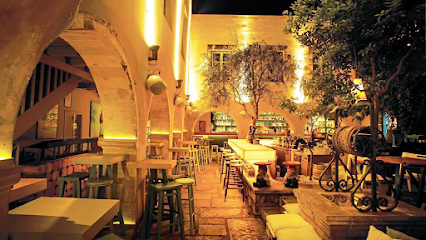
Avalon Rock Pub Chania
Discover Chania's nightlife at Avalon Rock Pub, where local charm meets vibrant entertainment in a welcoming atmosphere.
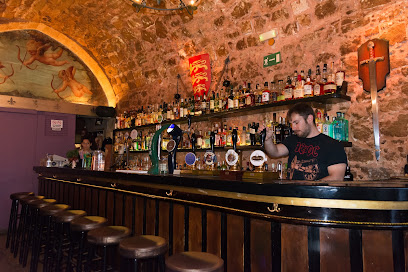
Fagotto Jazz Bar Chania
Experience the vibrant nightlife of Chania at Fagotto Jazz Bar, where live jazz music and exquisite cocktails create an unforgettable atmosphere.
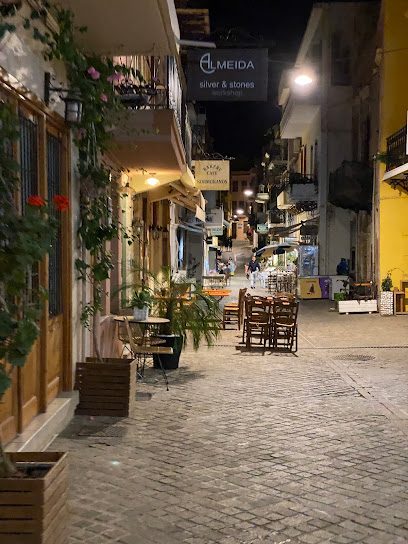
Peacock Tail Bar
Discover the vibrant nightlife at Peacock Tail Bar in Chania, Greece, known for its unique cocktails and lively atmosphere.
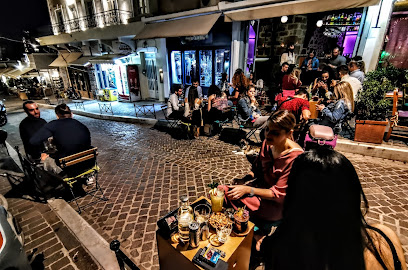
Ka Mon Irish Pub & Bar
Discover the lively atmosphere of Ka Mon Irish Pub & Bar in Chania, where authentic Irish hospitality meets the vibrant culture of Crete.
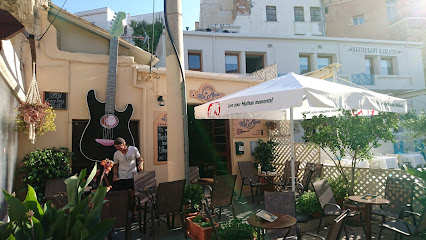
Βoulevard of broken dreams
Experience the vibrant nightlife of Chania at Boulevard of Broken Dreams, where cocktails and ambiance create unforgettable memories.
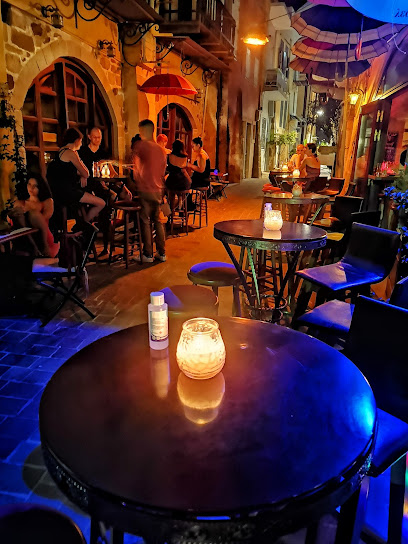
Synapsis - Gathering Bar
Experience the vibrant nightlife at Synapsis - Gathering Bar, Chania's premier destination for exceptional drinks and a lively atmosphere.
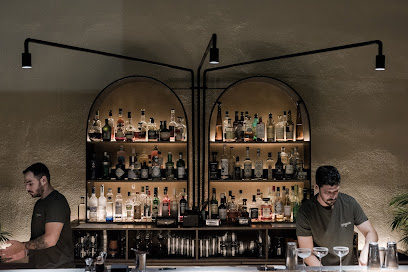
Vazaki Reloaded
Experience the vibrant nightlife of Chania at Vazaki Reloaded, where crafted cocktails and lively entertainment create unforgettable memories.
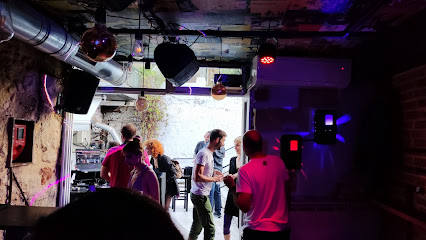
No Name All Day Bar
Discover the vibrant atmosphere of No Name All Day Bar in Chania, where delightful drinks and friendly service await every visitor.
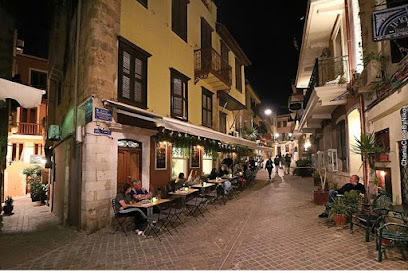
Local Phrases
-
- HelloΓειά σας
[Ya sas] - GoodbyeΑντίο
[Adio] - YesΝαι
[Ne] - NoΌχι
[Ochi] - Please/You're welcomeΠαρακαλώ
[Parakalo] - Thank youΕυχαριστώ
[Efharisto] - Excuse me/SorryΣυγγνώμη
[Signomi] - How are you?Πώς είστε;
[Pos iste] - Fine. And you?Καλά. Εσείς;
[Kala. Esis] - Do you speak English?Μιλάτε αγγλικά;
[Milate anglika] - I don't understandΔεν καταλαβαίνω
[Den katalaveno]
- HelloΓειά σας
-
- I'd like to see the menu, pleaseΘα ήθελα να δω το μενού, παρακαλώ
[Tha ithela na do to menou, parakalo] - I don't eat meatΔεν τρώω κρέας
[Den troo kreas] - Cheers!Εβίβα!
[Eviva] - I would like to pay, pleaseΘα ήθελα να πληρώσω, παρακαλώ
[Tha ithela na plirosso, parakalo]
- I'd like to see the menu, pleaseΘα ήθελα να δω το μενού, παρακαλώ
-
- Help!Βοήθεια!
[Voithia] - Go away!Φύγε!
[Fiye] - Call the Police!Καλέστε την Αστυνομία!
[Kaleste tin Astynomia] - Call a doctor!Καλέστε για γιατρό!
[Kaleste ya yatro] - I'm lostΈχω χαθεί
[Eho hthi] - I'm illΕίμαι άρρωστος
[Eimai arrostos]
- Help!Βοήθεια!
-
- I'd like to buy...Θα ήθελα να αγοράσω...
[Tha ithela na agoraso...] - I'm just lookingΑπλά κοιτάω
[Apla kitao] - How much is it?Πόσο κοστίζει;
[Poso kostizi] - That's too expensiveΑυτό είναι πολύ ακριβό
[Afto ine poli akrivo] - Can you lower the price?Μπορείτε να μειώσετε την τιμή;
[Boreite na miosete tin timi]
- I'd like to buy...Θα ήθελα να αγοράσω...
-
- What time is it?Τι ώρα είναι;
[Ti ora ine] - It's one o'clockΕίναι μία ώρα
[Ine mia ora] - Half past (10)Μισή (10)
[Misi (deka)] - MorningΠρωί
[Proi] - AfternoonΑπόγευμα
[Apoyevma] - EveningΒράδυ
[Vradi] - YesterdayΧθες
[Hthes] - TodayΣήμερα
[Simera] - TomorrowΑύριο
[Avrio] - 1Ένα
[Ena] - 2Δύο
[Dio] - 3Τρία
[Tria] - 4Τέσσερα
[Tessera] - 5Πέντε
[Pente] - 6Έξι
[Exi] - 7Εφτά
[Efta] - 8Οκτώ
[Okto] - 9Εννέα
[Ennea] - 10Δέκα
[Deka]
- What time is it?Τι ώρα είναι;
-
- Where's a/the...?Πού είναι ένα/το...;
[Pou ine ena/to] - What's the address?Ποια είναι η διεύθυνση;
[Pia ine i diefthinsi] - Can you show me (on the map)?Μπορείτε να μου δείξετε (στο χάρτη);
[Boreite na mou dixete (sto charti)] - When's the next (bus)?Πότε είναι το επόμενο (λεωφορείο);
[Pote ine to epomeno (leoforeio)] - A ticket (to ....)Ένα εισιτήριο (για...);
[Ena isitirio (ya)]
- Where's a/the...?Πού είναι ένα/το...;
History of Chania
-
Chania's history dates back to the Minoan civilization, which flourished from approximately 2700 to 1450 BC. The nearby archaeological site of Akrotiri showcases the advanced nature of Minoan society, known for its palatial structures, frescoes, and maritime trade. Chania served as a crucial port connecting the Minoans with other cultures across the Mediterranean.
-
From 1204 to 1669, Chania was under Venetian control, which significantly influenced its architecture and culture. The Venetians fortified the city, constructing the famous harbor and the imposing Firkas Fortress. The blend of Venetian and local styles can be seen in the Old Town's narrow streets, vibrant markets, and the iconic Venetian lighthouse, a symbol of the city.
-
After the fall of Venice, Chania came under Ottoman rule from 1669 to 1898. This period saw the construction of numerous mosques, such as the Giali Tzamisi, and the introduction of diverse cultural practices. The Ottomans also built the Kucuk Hasan Mosque and the impressive Arsenali, which served as shipyards and warehouses, further enhancing Chania's maritime importance.
-
Chania played a pivotal role during the Cretan revolutions against Ottoman rule in the 19th century. One of the most notable events was the revolution of 1866, which led to international attention and support for the Cretan cause. The struggle for independence ultimately culminated in the establishment of the Cretan State in 1898, marking a significant shift in the island's governance.
-
During World War II, Chania was occupied by Axis forces. The city became a center for the Greek resistance movement, with locals engaging in sabotage and intelligence operations against the occupiers. The Battle of Crete in 1941 was a significant event, showcasing the bravery of the Cretan people and their determination to resist foreign control.
-
Today, Chania is a vibrant city that reflects its rich history through its architecture, culture, and traditions. The Old Town, with its blend of Minoan, Venetian, Ottoman, and modern influences, attracts visitors from around the globe. The bustling markets, historical museums, and local festivals celebrate Chania's diverse heritage, making it a focal point of Cretan culture.
Chania Essentials
-
Chania is accessible by various means of transportation from other parts of Crete. The easiest way is to fly into Chania International Airport (CHQ), which is about 15 kilometers from the city center. There are regular domestic flights from Athens and Thessaloniki. If you are traveling from Heraklion, you can take a bus from the Heraklion Bus Station, which takes approximately 2 hours. Car rentals are also available, providing a scenic drive along the northern coast of Crete.
-
Chania has a reliable public bus system that connects various neighborhoods and destinations. The KTEL buses operate frequently and are an economical way to travel. Within the city, walking is the best option, especially in the Old Town, where streets are narrow and picturesque. For those looking for a more leisurely experience, bicycle rentals are available, allowing you to explore the waterfront and nearby beaches.
-
Chania is generally a safe city for tourists. However, it is advisable to take standard precautions. Areas with higher crime rates are rare, but petty thefts can occur in crowded tourist spots. Stay vigilant, especially in busy markets and public transport. Avoid poorly lit areas at night, and keep an eye on your belongings to prevent pickpocketing.
-
In case of emergency, dial 112 for immediate assistance. This number connects you to police, ambulance, and fire services. The local hospital is in Chania, and there are pharmacies throughout the city for minor health issues. It is advisable to have travel insurance that covers medical emergencies.
-
Fashion: Do dress modestly, especially when visiting churches and monasteries. Avoid wearing beachwear in town. Religion: Do respect local customs; when visiting religious sites, women should cover their shoulders and knees. Public Transport: Do offer your seat to the elderly and pregnant women. Don’t eat or drink on public buses. Greetings: Do greet locals with a friendly 'Kalimera' (Good morning). Eating & Drinking: Do try local dishes like moussaka and dakos. Don't waste food, as it is considered disrespectful.
-
To experience Chania like a local, visit the local markets such as the Agora, where you can find fresh produce and traditional Cretan products. Engage with locals over a coffee at a kafenio (local café) and ask for recommendations on hidden gems. Don't miss the chance to explore the beautiful beaches like Elafonissi and Balos, which are less crowded during the early morning or late afternoon. Additionally, try attending local festivals if they coincide with your visit for an authentic cultural experience.
Trending Landmarks in Chania
Nearby Cities to Chania
-
Things To Do in Rethymno
-
Things To Do in Crete
-
Things To Do in Heraklion
-
Things To Do in Pyrgos
-
Things To Do in Santorini
-
Things To Do in Kalamata
-
Things To Do in Mykonos
-
Things To Do in Nafplio
-
Things To Do in Athens
-
Things To Do in Olympia
-
Things To Do in Kos
-
Things To Do in Bodrum
-
Things To Do in Delphi
-
Things To Do in Samos
-
Things To Do in Patras













